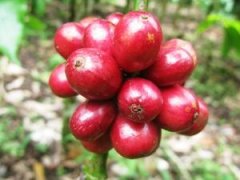Introduction to the characteristics of different kinds of coffee

Coffee is produced from the equator to 15 degrees north latitude and is produced in South America, Indonesia and Africa.
But the coffee produced from the equator to 15 degrees north latitude is too strong and bitter. In fact, the best coffee should be produced between 15 degrees north latitude and the Tropic of Cancer.
Yunnan Coffee in China
Coffee is a product of the tropics. You may not believe that the best coffee producing area in the world is in Yunnan Province of China. Unfortunately, Chinese people do not attach importance to coffee and do not know how to use coffee in exchange for foreign exchange. I don't have any hobbies, but I like what's in the cup very much. The so-called contents in the cup are not spirits, but coffee from all over the country. I have tasted it all over the world, but I don't know until today. The best coffee producer is not Colombia, not Turkey, not Indonesia, but Chinese mainland. After inspecting the coffee planting and primary processing base in Yunnan, international coffee organization tasting experts rated Yunnan coffee as the kind of small seed coffee processed by Colombian wet processing, which is the highest quality coffee in the world.
As we all know, coffee is the product of 15 degrees north latitude from the equator, so it is produced in South America, Indonesia and Africa. However, the coffee produced from the equator to 15 degrees north latitude is so strong and bitter that only some people who drink coffee and do not know its taste will like it. In fact, the best coffee should be produced between 15 degrees north latitude and the Tropic of Cancer.
Coincidentally, the southern part of China's Yunnan Province (especially close to Laos) and the northern part of Yunnan Island happen to be on top of this golden zone. Although Hawaii and Saudi Arabia in the United States are in this zone, on the one hand, there are no mountains and fog in Hawaii, and on the other hand, there is no water in the sandy desert, and coffee cannot settle down. As a result, the best coffee producer in the world is in China.
Brazil
Brazil is the producer of coffee, all grades and types of coffee account for 1/3 of the global consumption. There are many kinds of coffee here. Although there is not much superior coffee, it can be used to make mixed coffee with other coffee.
The characteristics of the taste: mild, moderate bitterness, soft aroma.
The best degree of fried culture: medium fried culture
Colombia
Rich in coffee production after Brazil, is the second largest coffee industry, from low-grade to high-grade products can be produced, some of which are rare in the world, mellow taste admiring. The most popular is Manning, which is rich in taste and has a pleasant sour taste. Supremo, which is also Colombia's first-class coffee, has a unique aroma and a sweet taste in bitterness. It's the best in coffee.
Mexico
Is a major coffee producer in Central America. The coffee here is comfortable and fragrant. The Mexican coffees selected are Coatepec, Huatusco and Orizaba, among which Cottpe is considered to be one of the best in the world.
Top quality beans: Aldora, Mexico
The characteristics of the taste: the grain is large and sour and sweet, strong and fragrant.
The best frying degree: medium ~ depth
Hawaii
To visit Hawaii, in addition to the beautiful beach, don't forget the Hawaiian coffee bean-Kona. The taste is sweet with the sour taste of wine, which is very special. The most traditional and famous coffee in Hawaii. However, due to the low production here, the surprisingly high cost, and the increasing demand for individual coffee in the United States and other places, its unit price is not only getting higher and higher, but also not easy to buy.
Taste characteristics: strong acid, mellow, all have tropical flavor.
The best frying degree: medium ~ depth
Indonesia
When it comes to Indonesian coffee, we must not miss the high-end Mantenin of Sumatra, which has a unique fragrant taste, slightly acidic taste and can be said to be the best in the world. In addition, Arabica coffee produced in Java is the favorite of Europeans, which is sweet in bitterness and sour in sweetness.
Superior quality beans: Sumatra Mantenin
Taste characteristics: bitter and full-bodied, but also sweet.
The best frying degree: depth
Costa Rica
The coffee beans produced at the high latitudes of Costa Rica are famous in the world, full-bodied, mild in taste, but extremely sour. The coffee beans here have been carefully processed, which is why they have high quality coffee. The famous coffee is produced in the Central Plateau (CentralPlateau), where the soil consists of successive layers of volcanic ash and dust. The first-class fragrance is strong and sour, and it is highly valued.
Top quality beans: Costa Rica Clara Mountain
Taste characteristics: moderate acidity and mellow taste.
The best frying degree: moderate
Angola
This is the fourth largest coffee industry in the world, but it produces only a small amount of Arabica coffee and is of high quality.
Characteristics of the taste: both fragrant and sour.
The best frying degree: medium ~ depth
Ethiopia
It is the hometown of Arabica coffee. It grows at high latitudes and needs a lot of manual care. There is the famous Esopiamoka, which is sour, fragrant and rich in yield, similar to wine.
Jamaica
Jamaica's national treasure, Blue Mountain Coffee, is perfect in all respects, just like wine, many wineries are now bought by the Japanese. The Japanese have bought most of the Jamaican coffee in recent years, so it is difficult to buy it on the market.
Superior quality beans: blue Mountain / High Mountain
Taste characteristics: have the same sour, bitter, sweet taste, good flavor.
The best frying degree: mild to moderate
Kenya
Kenya grows high-quality Arabica coffee beans, which almost absorb the essence of coffee cherries, with a slightly sour, thick aroma, is very popular among Europeans, especially in Britain, Kenya coffee surpasses Costa Rican coffee and becomes one of the most popular coffee.
Top quality beans: Kenya AA (double A)
Taste characteristics: strong sour and fragrant, the favorite of the Germans.
The best frying degree: depth
Yemen
The Yemeni mocha was once popular, and it is still the soul of other coffee beans or mixed coffee beans. Yemen, commonly known as Arabia, is the birthplace of the Arabian species, once known as "mocha coffee", but it was all the rage for a time, but now it is no longer a grand occasion. However, with its mellow flavor and rich flavor, it is still quite favored by consumers.
Top quality beans: Golden Horse Tarim
Taste characteristics: slightly sour and strong aftereffect, but also sweet taste.
The best frying degree: medium ~ depth
Peru
Peruvian coffee, a rising star, is gradually opening up its popularity and entering the world. It is mostly planted in high-altitude areas, the planned planting makes the yield greatly increased, the taste mellow, the right acidity, more and more people like it.
Taste characteristics: the taste is mellow and the acidity is just right.
The best frying degree: moderate
Guatemala
The central region of Guatemala is home to world-famous coffee with excellent flavor. Most of the coffee beans here have charcoal flavor and cocoa flavor, but their acidity is slightly stronger.
Taste characteristics: bitter and fragrant, good taste.
The best frying degree: depth
El Salvador (Central America)
It is listed as the producer of Asamerdo Group together with Mexico and Guatemala, and is fighting for the top one or two places in China and the United States with other countries. Produced in the highlands, for the size of the large coffee beans, fragrant and mild taste.
Top quality beans: El Salvador SHB
The characteristics of Tao: sour, bitter and sweet are mild and moderate.
The best frying degree: medium ~ depth
Honduras (Central America)
The washed coffee beans in the mountain areas are well received, while the coffee beans produced in the lowlands are of lower quality.
Characteristics of the taste: sour and slightly sweet.
The best frying degree: medium ~ depth
Cuba
It is famous for producing sugar, tobacco and coffee. Coffee was introduced by the French from Haiti in the mid-18th century. The coffee beans are moderately large ─ grains and bright green coffee beans.
Top quality beans: Mount Crisdale, Cuba
Characteristics of taste: stable taste. A balance of sour, bitter and sweet.
The best frying degree: moderate
Important Notice :
前街咖啡 FrontStreet Coffee has moved to new addredd:
FrontStreet Coffee Address: 315,Donghua East Road,GuangZhou
Tel:020 38364473
- Prev

Coffee knowledge production method of high-quality coffee
After harvest, peel, pulp, racing peel and silver peel should be removed before shipping and listing. There are two kinds of methods: drying (also known as natural or non-washing) and washing. The drying method is relatively simple. First of all, spread the freshly harvested fruit on the sun field for a week or two until the fruit crackles and dries naturally. After that, the dried pulp is removed by a sheller.
- Next

The choice of dairy products as the best companion of black coffee
The earliest encounter between coffee and milk dates back to the 17th century. It is said that Turks never drink milk in their coffee because they are generally lactose intolerant. Later, a Venetian named Johamnes Diodato invented this method, and he is also the now famous inventor of praises bread. At present, there are many dairy products on the market that can be paired with coffee.
Related
- Beginners will see the "Coffee pull flower" guide!
- What is the difference between ice blog purified milk and ordinary milk coffee?
- Why is the Philippines the largest producer of crops in Liberia?
- For coffee extraction, should the fine powder be retained?
- How does extracted espresso fill pressed powder? How much strength does it take to press the powder?
- How to make jasmine cold extract coffee? Is the jasmine + latte good?
- Will this little toy really make the coffee taste better? How does Lily Drip affect coffee extraction?
- Will the action of slapping the filter cup also affect coffee extraction?
- What's the difference between powder-to-water ratio and powder-to-liquid ratio?
- What is the Ethiopian local species? What does it have to do with Heirloom native species?

